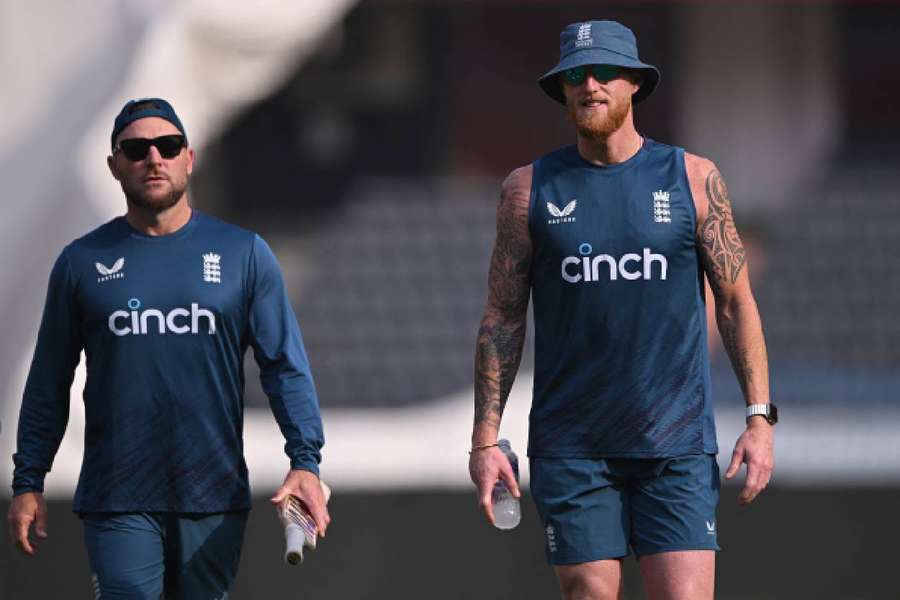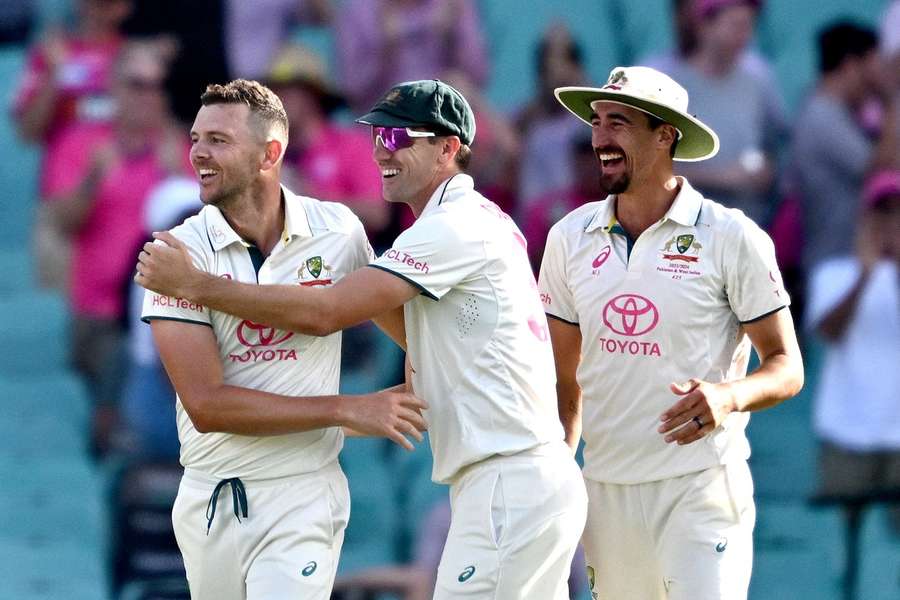Cricket Corner: What's considered winning in India and what even is the ILT20?

In a nod to the longest form of the game - Test cricket - the article is broken into three sections to mirror the main intervals in a day’s play: Lunch - the main course; Tea - something extra; and Stumps (the end of play) - something to ponder over a few drinks at the bar.
Lunch: What’s winning in India?
It’s only January but it’s safe to say that England’s five-Test tour of India (starting Thursday) is the biggest Test series of 2024. There are only three sides that really offer four or five-match series these days and that’s Australia and the aforementioned two. Without a doubt, these are also currently the strongest three sides in the format. That gives any series between two of the three an added edge. They have a huge bearing on discussions of who’s the best side at the moment. Of course, there is the World Test Championship table but the prime conversational gauge of ability is how those three do against each other home and away.
Roughly this time last year Australia played India and lost 2-1. That series stressed once again that winning in India is the Mount Everest of cricket. Australia also played England last year and retained the Ashes away (2-2), going to show that there isn’t much between them. With England now in India, they can put some serious points on the board - both literally and figuratively - if they perform. If they equal Australia’s effort of one win and a draw, that’s a good achievement. If they better it, that’s virtually a win. That’s how experts are framing it.
No one really expects England to win the series such is India’s incredible strength at home on pitches that are tailored heavily to their strengths - namely, their incredibly strong spin attack and know-how with the bat on turning decks. But if anyone can spring a surprise in India, it’s probably England’s brain trust of captain Ben Stokes and coach Brendon McCullum. Since they took over the red-ball reigns in mid-2022, the so-called ‘Bazball’ revolution has yielded an impressive 13 wins from 18 matches with just four losses. They don’t like draws and they probably won’t see many draws in India as the pitches tend to deteriorate quickly, rushing on a result.
Here’s some context: Since the turn of the millennium, India have only lost three Test series at home - to South Africa in 1999/00, to Australia in 2004/05 and most recently to England in 2012/13. Since that latter series, they have lost just three Tests at home from 46. As I said, Everest. When England won over a decade ago they could rely on a tandem tweak attack of Graeme Swann and Monty Panesar - two of the best spinners they have produced. This time they have the steady arm of Jack Leach with support from talented yet inexperienced allrounder Rehan Ahmed and uncapped finger spinners Tom Hartley and Shoaib Bashir, who had some visa issues. For the first Test in Hyderabad, England will field the former three with added support from Joe Root and just one front-line seamer. Throw all the spinners at the wall and see who sticks... or turns, rather.
Tea: We need to talk about Pat (and Josh)
The Australian red-ball summer wraps up this week with the second Test against West Indies also starting tomorrow in Brisbane. The first Test in Adelaide was wrapped up in a little over two days with the media mostly turning away from the one-sided result to focus on the wonderful story of West Indies debutant Shamar Joseph. The right-arm quick from a remote jungle village in Guyana had played just a handful of first-class matches before his call-up but shone with the bowl, taking five wickets in his first innings including that of now-opener Steve Smith with his very first delivery! He also added scores of 36 and 15 from number 11 in what was a thoroughly encouraging reminder that the talent pool in the West Indies hasn’t dried up just yet.
Joseph was the heart warmer but the Aussies dominated the contest with their quicks continuing their summer of total destruction. Josh Hazlewood led the way in Adelaide with nine wickets but captain Pat Cummins and Mitchell Starc chipped in as well. Cummins, in particular, has had an incredible summer so far. His figures in the four matches against Pakistan and West Indies are, in order of innings, as follows: 2/35, 1/11, 5/48, 5/49, 5/61, 1/24, 4/41 and 0/25. His 23 wickets in those matches have come at an average of 12.78. If you exclude his wicket-less innings in Adelaide, it’s 11.69. Either way, that’s the lowest bowling average of anyone (with 20 or more wickets) in an Australian home Test summer since 1931/32.

Josh Hazlewood hasn’t been too bad either. He’s taken 20 wickets himself across the four completed Tests at just under 15. If it weren’t for Cummins' presence in the side, we would be talking about Hazlewood a lot more. He also passed the 250-wicket mark in Adelaide, joining his colleagues Cummins, Mitchell Starc and Nathan Lyon in elite company. Hazlewood has the fewest wickets of the bunch but is just one more scalp from breaking into Australia’s top 10 wicker-takers of all time. Surely, he’ll cross that mark in Brisbane and another milestone for the sparkling quartet will be set. Four of the top 10 bowlers in the country's history all in one attack and they still have plenty of gas in their respective tanks. Quite incredible.
Stumps: What even is the ILT20?
Last week we touched on the Big Bash League (BBL) just as it was heading into the playoffs (Brisbane Heat won the final on Wednesday), contrasting it with the hyped Twenty20 (T20) competition of the moment - South Africa's SA20. But there is another league also underway which, like the SA20, drained the BBL of talent just as it was getting to the business end of things. That’s the International League T20 (ILT20). You’d be forgiven for glossing over this one as it is not held in one of the major cricketing hotbeds but rather in the United Arab Emirates - a cricket-playing place, and the home of the ICC, but not a country where cricket stadiums are either abundant or packed. But hey, they wanted a slice of the T20 pie too!
Because the ILT20 is sanctioned by the UAE’s cricket board and not an ICC full member, the first edition of the tournament (2023) did not have official top-level T20 status, in a statistical sense. But that changed in December, with the tournament becoming the first associate-run franchise league to be recognised in this way. That’s a huge boost for the league's relevance. Another advantage the league possesses is its generous overseas-player rule which allows each side to field nine imports! They must have two local players but that leaves plenty of room to draw in better-known talent. And they have done just that. Incredibly, six of the BBL’s overseas players (Laurie Evans, Sam Billings, Colin Munro, James Vince, Jamie Overton and Adam Hose) left the tournament as their respective teams were entering the playoffs to play in the ILT20 instead.
Curiously, the Mumbai Indians franchise run teams in both the SA20 and ILT20 - MI Cape Town and MI Emirates. With Rashid Khan injured, they decided to task last year’s MI Emirates captain Kieron Pollard with captaining their Cape Town team and move Nick Pooran over to the Emirates to captain that side when the ILT20 began. Only, Pooran was at the SA20 with another team - Durban’s Super Giants - so he had to leave early to fill the role. It’s all pretty hard to disentangle but it’s not supposed to make sense… it’s supposed to make money. In 2021, The broadcast rights to the league for 10 years were sold for USD 120 million to India’s Zee Entertainment Enterprises. And there you have it - the reason it exists.
At a glance, it seems a bit chaotic having these leagues overlap. The IPL franchises won’t be too concerned about encroaching on the BBL or other leagues they don’t have a stake in but cramming the SA20 and ILT20 on top of each other feels counterproductive. Interestingly though, the ILT20 franchises are not all IPL affiliates as in South Africa. Only some of them are - MI Emirates, Abu Dhabi Knight Riders, Dubai Captials and Gulf Giants - but the other two are owned by separate investors. Desert Vipers, for example, are bankrolled by Avram Glazer of Manchester United fame... or infamy depending on how you look at it. So, who are you rooting for? As for me, I just want it all to make more sense one day.




